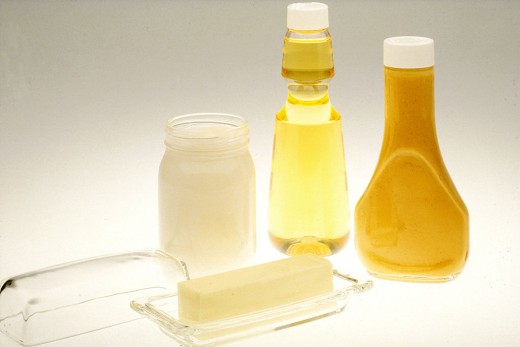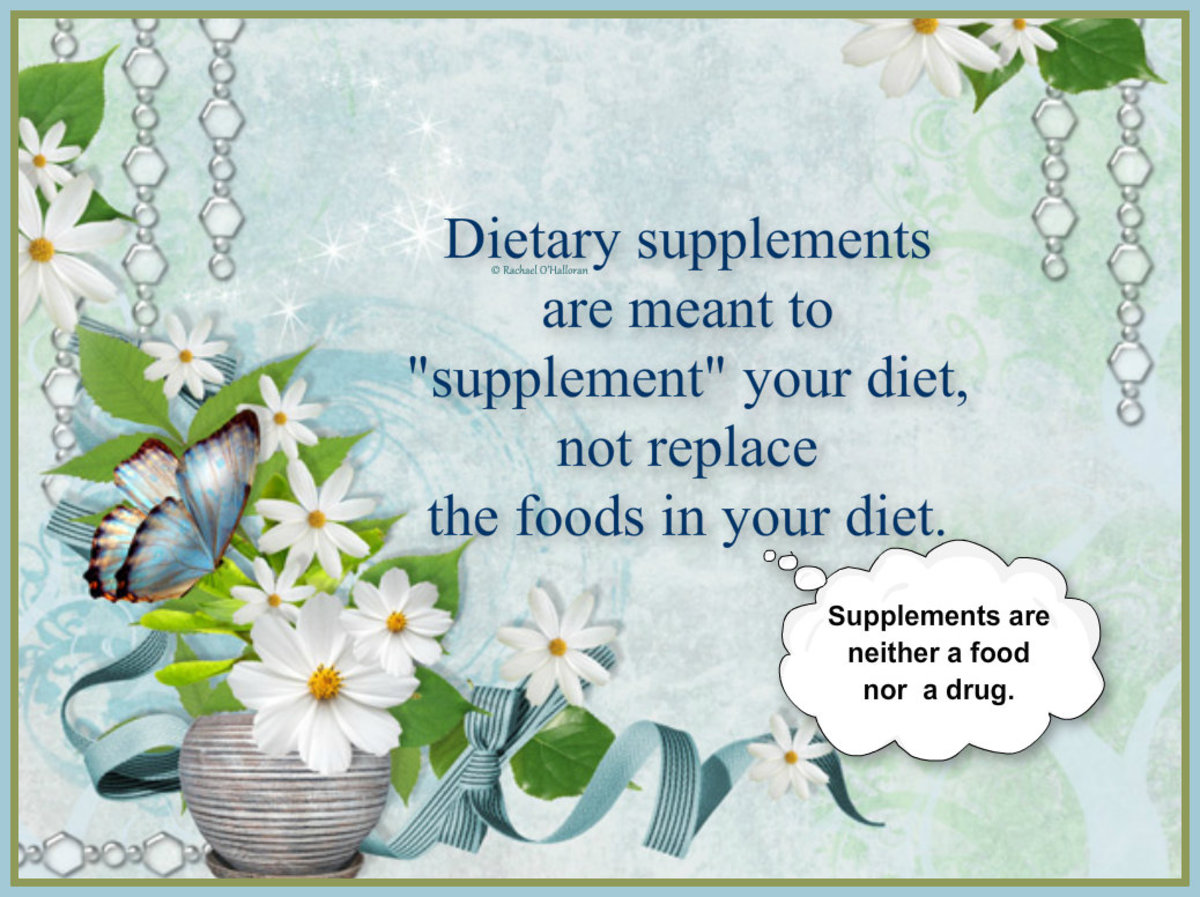Fat Soluble Vitamins
Some vitamins interact with fats

Which Vitamins are Fat Soluble and Which are Water Soluble?
Some vitamins are considered fat soluble, and some are water soluble, but what's the difference between the two?
Each type behaves differently in your body, and once you understand the difference, you'll also understand the important role fat plays in our diets.
Fat-soluble vitamins include A, D, E and K.
Water-soluble vitamins consist of vitamins B and C.
You need both types of vitamins, because your body processes them differently, so your diet needs to include fats in order to take advantage of the benefits of the fat-soluble group.
But you also need to understand how fat-soluble vitamins are stored in your body.
And, it's important to know the downside of including too much of a good thing in your diet (such as excessive intake of fat-soluble vitamins or foods containing those vitamins).
Video: Fat Soluble & Water Soluble Vitamins Explained
What is the DIfference Between Fat Soluble and Water Soluble Vitamins
Fat solubles are absorbed through the fat traveling through your digestive system, and then they're stored in your fat tissues.
Once these vitamins are stored in your fat tissues, they generally don't vacate the premises, and you accumulate too much in your system, it can create health problems (more on that in a bit).
Unlike fat soluble vitamins, those that are water soluble pass through your body and are excreted each day in your urine. This means you need a steady supply of those vitamins to avoid conditions resulting from deficiency.
Food: The best way to get your vitamins


Foods High in Fat-Soluble and Water-Soluble Vitamins
Our bodies use both types of vitamins, and the vitamins interact with each other in many ways.
Although vitamin supplements are common, and can help augment a diet that isn't balanced or is deficient in some areas, the best source of vitamins is through eating a balanced diet.
Sources for Fat Soluble Vitamins:
- Vitamin A: (Also known as retinol); found in dairy products, liver, chicken, organ meats (particularly liver and kidneys), trout, herring, mackerel and fish oil. Colorful vegetables (those that are green, yellow and orange) are also a source of Vitamin A; they produce beta-carotene, which converts to that vitamin in your body.
- Vitamin D: Sunlight (at least 10 minutes a day on an exposed portion of the body), fortified dairy products and cereals, oily fish, cod liver oil.
- Vitamin E: This key antioxidant is found in nuts, whole grains, avocados, Brussels sprouts, corn oil, olive oil, safflower oil, salmon and mackerel, tomatoes, spinach, mangoes and blackberries.
- Vitamin K: Available in small amounts in many vegetables, meats and whole-grain products.
Mega-doses of fat soluble vitamins (from supplements, or more rarely, through your diet) can cause serious health problems.
Sources for Water Soluble Vitamins:
- Vitamin B: Apricots, bananas, milk, eggs, asparagus, broccoli, nuts, fish, potatoes, spinach, Brewer's yeast, meat and poultry.
- Vitamin C: Foods rich in Vitamin C include citrus fruits, strawberries, guava, kiwi, cantaloupe, vegetable juices, Brussels sprouts and red and green peppers.
You need a constant source of water-soluble vitamins because they pass through your intestines, into your blood stream and are excreted daily.
How Fats Affect Absorption of Medications
How Fats and Medications Interact
As with fiber in the diet, fat plays several roles too. Because fat is often needed for your body to absorb and process various things, it is also one way you absorb medications.
Frequently, during drug research, one stage of testing will include testing the drug on volunteer subjects being fed a high-fat diet. This tells researchers whether the drug formulation is readily excreted (such as water-soluble vitamins are passed through the system) or if they're stored in the body for longer times.
This information is important in determining the amount and frequency for safe doses, and the time to allow for the drug to 'wash out' of your system.
A Nutritionist's Tips for Choosing the Right Cooking Oils
Fats and Cooking | Choosing Oils for Cooking
Not all fats are created equal!
Aside from soluble and insoluble fats, there are other considerations to know when you use fats for cooking.
Many people prefer to cook with good vegetable oils due to problems related to animal fats (and this is a smart thing to do!). But it's helpful to know the "smoke point" of oils, or the point at which they will start burning. Some oils can withstand higher temperatures, and are far healthier for frying foods. Watch the video here to see how to choose the right oils for cooking. Some oils will change properties as they're exposed to heat, so avoid those with a lower "smoke point."
In general, though, cooking with oils rather than solid fats (such as butter, margarine, shortening or lard) is best, and your body will thank you for it.
What about you? Take this poll!
Where do you get most of your vitamins each day?
Vitamin Poisoning: Hypervitaminosis
Yes, you can indeed take in too many vitamins in some cases, which can create a harmful effect called hypervitaminosis (which translates to having an excess of a vitamin in your body), also known as 'vitamin poisoning.'
If you have too much Vitamin A in your system, the condition is referred to as 'hypervitaminosis A;' if you have too much of another vitamin, that one will be indicated in the diagnosis.
Fat soluble vitamins are the biggest culprits in this condition, since they're the ones your body does not excrete so readily, but some over-use of Vitamin B can result in problems.
The symptoms of overdosing depend on which vitamin is involved. Hypervitaminosis A (too much Vitamin A) can cause headaches, nauseousness, vomiting, abdominal pain, fatigue or lethargy, changes in vision and and impaired state of consciousness.
This condition can also harm the fetus in pregnant women and create birth defects, so women who are expecting a baby should limit their intake of this vitamin during gestation. Follow your physician's guidelines for the appropriate amount to take; prenatal vitamins are generally designed to have appropriate levels for pregnancy.
Hypervitaminosis D requires more than 50,000 units a day for an extended period of time (more than three months) to manifest. Symptoms can include pain in the bones, swelling in bony areas, eczema (scaly skin), patches of hair loss, nauseousness, liver failure, pressure in the head and other issues.
If you have been consuming large amounts of either vitamin and are experiencing unusual symptoms, check with your physician and be tested for these conditions.
As you can see through this article, it's important to understand the role of fats in your diet, and how they help us absorb and store vitamins. Overall, there are far more benefits than risks, but balanced information is crucial to living a life that is balanced nutritionally.






